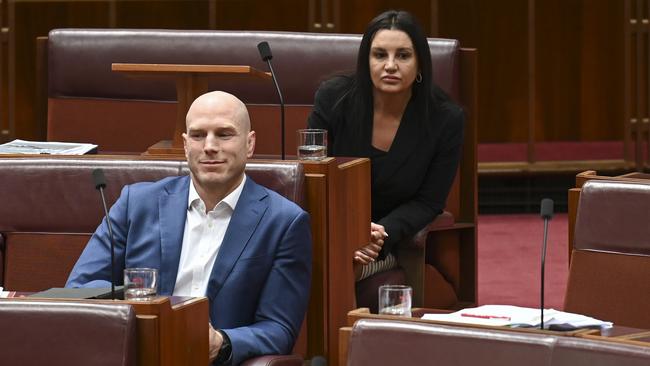David Pocock and Jacqui Lambie should hold out on new super laws for national interest


Paradoxically, that increased optimism stems from a government double-cross.
Most people have been double-crossed by someone they trusted. That’s life.
But only stupid people trust the double-crossers a second time.
I don’t always agree with the views of crossbench senators David Pocock and Jacqui Lambie but they are not stupid.
They have been double-crossed by the government over the industrial relations legislation and I can’t imagine they will allow themselves to be double-crossed again.
Accordingly, I think they will honour their word and not be tricked into backing down on their vital amendments to the government’s superannuation proposal.
While I might be wrong, that gives the nation a better prospect that the superannuation act will not pass the Senate in its present form.
Today I will first remind readers of my commentary last August under the heading “Labor’s unfair superannuation tax set to fail after public pressure plus Teals and Independents”.
Then I will set out how two key independents, Pocock and Lambie were double crossed in their industrial relations deal.
There is no widespread opposition to the original thrust of the superannuation proposal which was to continue to tax most superannuation in the normal way, but the tax rate on total superannuation balances exceeding $3m, would be 30 per cent instead of 15 per cent.
But, as proposed by the government, the $3m trigger point was not indexed.
In a few years that unindexed trigger would hit vast numbers in middle Australia. The $3m had to be indexed to the CPI.
The Coalition, the Senate crossbenchers, led by Pocock and Lambie plus the Teals and two independents in the House of Representatives agreed to unite and require two amendments - that the $3m, 30 per cent tax rate trigger point be indexed so middle Australia would be protected and second that there should be no tax on unrealised capital gains. Such a tax would create a world precedent which would damage the capital structure of the nation.
I believe taxing unrealised gains was inserted, not out of fairness, but to protect the government’s union mates in the industry superannuation funds who had antiquated accounting systems that could not provide the detail necessary to implement a 30 per cent superannuation income tax on those with assets of more than $3m in superannuation.
With the help of my wonderful readers, the August commentary set out a simple formula whereby the government could protect most of its revenue projections by retaining a 30 per cent income tax on assets over $3m and not taxing unrealised gains and inflicting so much damage on the superannuation movement.
The legislation is now before the Senate and my guess is the government will offer the indexation concession and attempt some deal to get Lambie and Pocock across the line on taxing unrealised gains.
That’s where the industrial relations double cross comes in.
Last February, to get Pocock and Lambie to support the second tranche of its industrial relations legislation the government had agreed to review the suitability of the Fair Work Act’s small business definition. (Ultimately Lambie’s vote was not needed) .
The definition of small business was vital in starting enterprises in Australia.
Most businesses with less than 15 employees, the previously legislated benchmark definition, are thinly capitalised and usually rely on the family home as security to provide the capital to enable the business to survive.
Previous governments of both parties recognised this, so when enterprises with less than 15 employees retrenched employees they were not required to make retrenchment payments. They were required to pay holiday and long service leave.
The industrial relations legislation now forces them to pay retrenchment benefits.
A review of that change would have shown that the previous act enabled a vast number of enterprises to start up in high-risk situations and was responsible for much of Australia’s innovation, risk-taking, and employee training.
It represents a huge blow to innovation in Australia and ultimately our productivity.
On the other side, for employees, there is currently clear unfairness given the fact that if they worked for a larger enterprise, they would get retrenchment benefits.
If the agreed review was reported before the 2025 election it would have highlighted the damage the legislation was inflicting on future employment of young people.
The Albanese government is planning to delay that promised review into small business exemptions from workplace laws until after the election, Workplace Relations Minister Murray Watt has declared that “after the initial consultation period began, stakeholders expressed concerns to the Fair Work Ombudsman about the number of consultation processes currently on foot”.
“Given the government’s desire to ensure all voices are heard throughout the review, the decision was made to extend the time for consultation,” he said.
That problem was not mentioned when the industrial relations deal was done.
The superannuation lining up of the Coalition, the crossbenchers in the Senate plus the Teals and the independence in the House of Representatives was a major achievement for the nation.
But such agreements can break up and the industrial relations double-cross is a reminder to all the parties that pre legislation deals with the government have a history of vaporising.
Stick to your guns in the national interest.





I am increasingly optimistic that the nation damaging superannuation legislation will not pass the Senate in its present disastrous form.